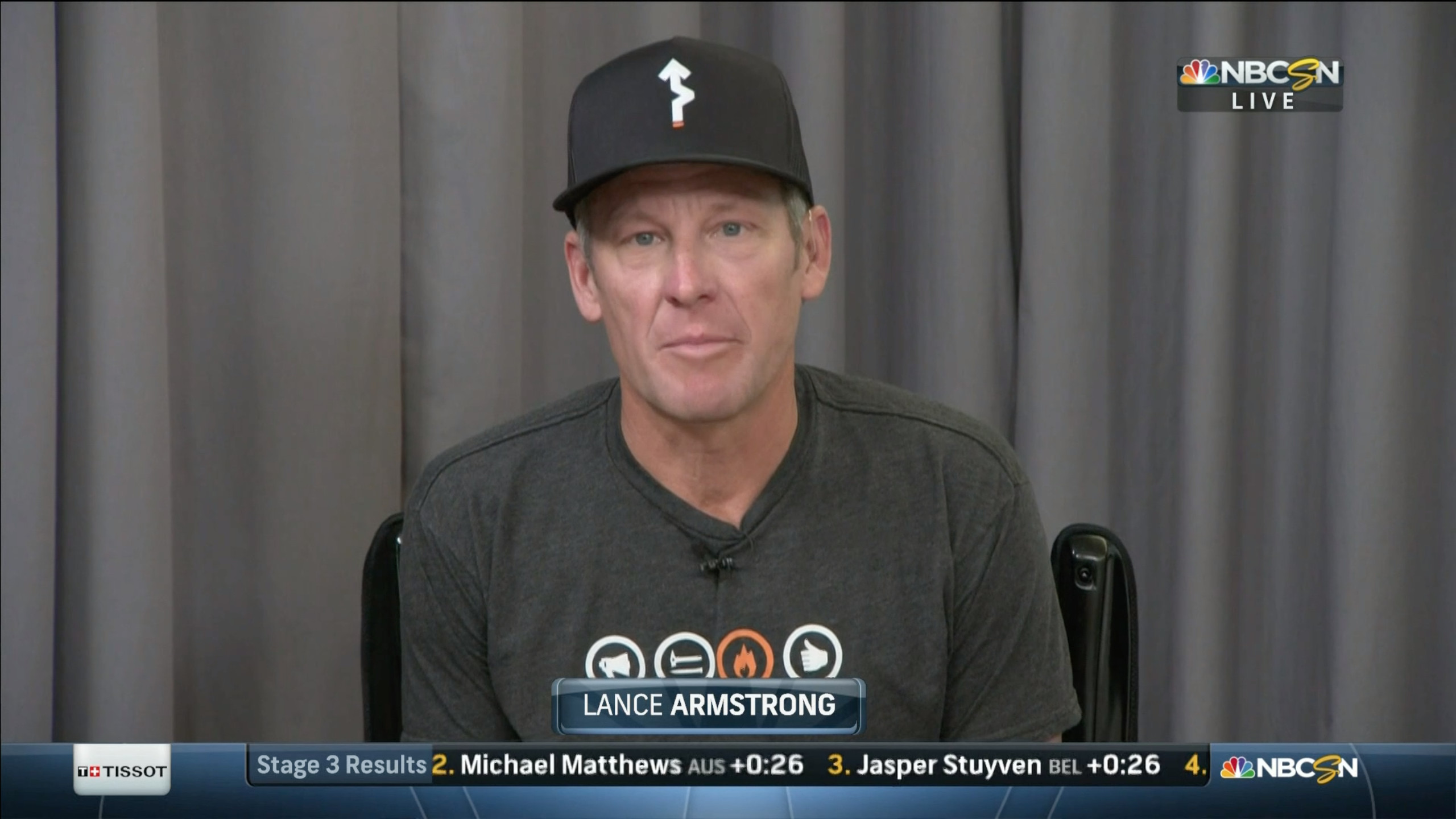Sign up for The Media Today, CJR’s daily newsletter.
In 2013, during a televised interview with Oprah Winfrey, Lance Armstrong, the cyclist, admitted to taking performance enhancing drugs throughout his career and lying about it. The admissions came shortly after cycling’s international governing body stripped Armstrong of his seven Tour de France victories and banned him for life from competition.
One might have expected that Armstrong’s admission and ban would rule out a future as a cycling commentator. Yet he has remained the world’s best-known cyclist (with 3.4 million followers on Twitter and a memoir, It’s Not About the Bike (2000), that topped the New York Times’s best-seller list) and an expert at reading a bike race—which may explain why, this year, he was welcomed as an analyst by NBC Sports to cover the Tour de France. During the race, NBCSN, which holds exclusive rights to broadcast the tour in the US through 2023, also seized an opportunity to promote a half-hour interview special, “Lance Armstrong: Next Stage,” which first aired in May.
Outside magazine, which has reported on Armstrong throughout his career and has partnered with him on tour coverage since 2017, touted “exclusive updates” from Armstrong throughout the race, and promoted Armstrong’s podcast, The Move, which provides Tour de France updates and analysis in 45-minute daily episodes. “If you tuned in to our recaps last summer, you know that, as commentators go, Lance Armstrong punches hard but seldom punches below the belt,” the text at the top of Outside’s coverage reads. “And unlike the milquetoast play-by-play and punditry the networks deliver in their coverage—it’s tough to bite the hand that feeds—he’s not afraid to rip into Tour organizers, team managers, competitors, and drunk fans making a nuisance of themselves. Lance knows what plays.”
During this year’s Tour, even as Armstrong’s astute technical analyses spurred headlines, the fact that he was given the opportunity attracted criticism. His prominence in media coverage of the Tour “has not gone over well with a vocal part of the audience, many of whom questioned the appropriateness of promoting a rider whose doping activities led to a lifetime ban from the sport,” Pat Malach wrote for CyclingNews, a cyclists’ website. The Virginian-Pilot’s Bob Molinaro asked whether Armstrong was the only person up to the task: “For this job, NBC couldn’t have chosen a former cyclist who hasn’t been barred from the sport?”
It is interesting to watch NBC Sports Network's gradual rehabilitation of Lance Armstrong. I'd be interested to hear what you think of letting Armstrong, given the events of the last 20 years, appear as an expert commentator.
— Ray Suarez (@RaySuarezNews) July 9, 2019
NBCSN did not respond to questions from CJR about the network’s decision to include Armstrong in its Tour de France coverage. (A spokesperson did say that Armstrong was not paid for his contributions during the Tour, or for doing the May interview.)
Chris Keyes, the editor of Outside, says that doping does not discount the fact that Armstrong is an expert on the ins and outs of bicycle racing. “We think he has incredible insight on the Tour as a veteran rider,” Keyes says. “I think there’s no one in America who knows the Tour de France better than Lance Armstrong.”
Keyes points out that former athletes who have used performance enhancing drugs in other sports, such as baseball’s Alex Rodriguez, make regular appearances on television. Christian Vande Velde, a former teammate of Armstrong’s who has also appeared in NBCSN’s Tour de France coverage, has worked as a cycling analyst for that network since 2014. Vande Velde received a six-month ban from competition in 2012. (That year, in a Chicago Tribune story about Vande Velde, Philip Hersh noted that the paper had declined to cover a victory by the cyclist “because of unanswered questions” concerning, among other things, his own rumored drug use.)
Ignoring an entire era of former professionals would leave a gap in cycling’s history, Neal Rogers—an editor-at-large for CyclingTips, an enthusiasts’ site, who has covered professional cycling for nearly 20 years—says. Athletes who raced during cycling’s “doping era” are now involved in all aspects of the sport, from commentary jobs to managing teams. Still, he believes that giving Armstrong prominent placement on television is “not a good look,” he says.
“What does it tell sort of the average person?” Rogers asks. “You can have a lifetime ban, be found guilty for cheating, and you’re welcomed back.”
Armstrong’s presence on NBCSN hasn’t appeared to hurt ratings. Last year, according to a recent VeloNews story about NBC’s Tour de France coverage, “between 200,000 and 300,000 viewers tuned in each day on television. In 2009, Lane Armstrong’s comeback year, that number was twice that size.” This year, as of July 23, viewership of the Tour hovered at 307,000, up 11 percent from 2018. Whether the boost in ratings can be attributed to Armstrong’s presence or to a more exciting competition is impossible to tell.
The Tour wrapped up over the weekend. Stormy weather forced race organizers to alter the planned route, shortening two stages of racing. On Sunday, a 22-year-old Colombian named Egan Bernal stood victorious on the top step of the podium in Paris. Armstrong did not make any appearances on NBCSN during the Tour’s final days, but continued with his podcast, which Outside excerpted for its own coverage. On Twitter, Armstrong wrote that, even though the Tour had concluded, his podcast “keeps moving on.”
ICYMI: Chuck Todd demonstrates a basic misunderstanding of his job
Has America ever needed a media defender more than now? Help us by joining CJR today.



